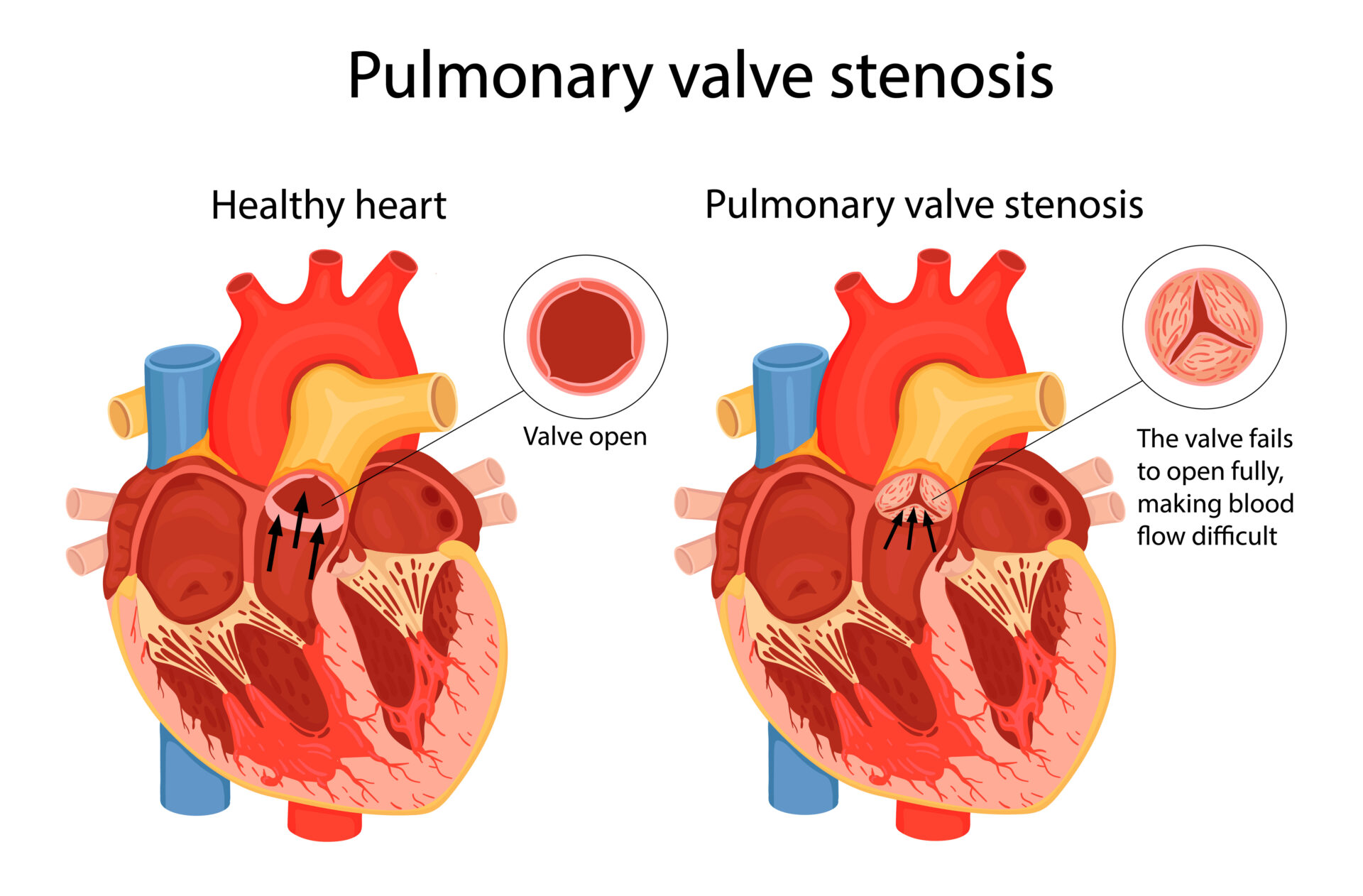In the simplest terms, valvular heart disease is a condition stemming from malfunctioning or damaged heart valves. Some people are born with dysfunctional heart valves, while others experience damage due to infection, degeneration (excessive wear, usually occurring with age), and the effects of general heart disease.
How a Healthy Heart and Heart Valves Work
The heart features four chambers that receive and pump out blood:
- Left atrium
- Right atrium
- Left ventricle
- Right ventricle
It also has four heart valves that keep the blood flow moving:
- Tricuspid valve connecting the right atrium and ventricle
- Pulmonary valve connecting the right ventricle and the pulmonary artery
- Mitral valve connecting the left atrium and ventricle
- Aortic valve connecting the left ventricle and the aorta
When all components of the heart are working correctly, the blood flow through the heart goes as follows:
- The right coronary artery sends deoxygenated blood into your heart through the right atrium.
- The right atrium receives the blood, which the tricuspid valve pumps into the right ventricle.
- The pulmonary valve pumps the blood into the lungs through the pulmonary artery for oxygenation.
- The oxygenated blood then flows back into the left atrium, which the mitral valve pumps into the left ventricle.
- The aortic valve then pumps the blood into the aorta to supply blood to the rest of the body.
This is a basic breakdown of how the heart maintains blood flow and does not account for other actions required for proper operation. Still, it highlights how all four chambers and heart valves must function properly to maintain strong, healthy blood flow that moves in the right direction.
Types of Valvular Heart Disease
If there is damage or dysfunction to how any of the four heart valves open or close, the blood could move in the wrong direction or fail to flow forward, leading to pooling in the heart and other damaging effects.
For the most part, damaged heart valves can exhibit three main types of disfunction:
Atresia
Atresia is a congenital defect wherein the heart valve does not develop an opening for the blood to go through during formation, preventing blood from moving forward. Atresia can affect any of the four valves and is most common with the tricuspid or pulmonary valves.
Regurgitation
Regurgitation is the technical term for when blood is forced to flow backward due to a malfunctioning heart valve leaflet, or the component of the valve that allows it to open and close. When the leaflet does not close tightly the way it should, blood can leak back into the valve.
Stenosis
Stenosis occurs when the leaflets thicken, stiffen, or become stuck. The heart valve cannot open completely, preventing enough blood from entering the opening and passing through the chambers or arteries.

Causes of Valvular Heart Disease
Valvular heart disease can be something you are born with, develop over time, or be linked to other heart-related issues or other forms of heart disease:
Congenital Heart Valve Disease
Birth defects cause the valves to develop incorrectly. Often, a leaflet is missing or underdeveloped, so the valve cannot close all the way.
The most common issue in congenital heart valve disease is a malformed aortic valve, wherein only two leaflets develop as opposed to the necessary three.
Endocarditis
Endocarditis occurs when bacteria infect the bloodstream and travel to the heart. The bacteria can land on the surfaces of the valves, causing them to develop severe infections. The bacteria can wreak havoc on the leaflets, preventing them from functioning properly.
Rheumatic Disease
One of the more uncommon issues in the United States, rheumatic disease can develop if a strep infection is left untreated. As the immune system struggles to kill off streptococcus pyogenes on its own, it can cause tissue within the body to inflame and scar, even in the heart. Rheumatic disease occurs when the heart valve tissue is damaged from scarring.
Additional Heart Complications
There are many conditions or occurrences that can cause the heart valves to malfunction, including:
- Age-related wear
- Autoimmune diseases
- Genetics
- Heart attacks
- Heart failure
- High blood pressure
- Plaque buildup in the aorta
When Should I Talk to My Cardiologist About Valvular Heart Disease?
While valvular heart disease can affect anyone, some people are more at risk of developing this complication. Speak with your cardiologist about this disease if the following risk factors apply to you.

Risk Factors
- History of bacterial infections
- You are 65 or older
- Heart disease runs in your family
- You have high blood pressure, cholesterol, diabetes, or other conditions that directly affect the heart
- You were born with congenital heart disease or other heart-related birth defects
Symptoms of Valvular Heart Disease
It is wise to monitor your heart health, especially the health of your heart valves, since symptoms of damage can go unnoticed or undetected for years. Once noticeable symptoms develop, you may experience:
- Chest pain
- Difficulty breathing, especially during exercise or when lying down
- Episodes of dizziness
- Excessive fatigue
- Heart murmur
- Irregular heartbeat
- Swelling in the abdomen
If you experience any of these symptoms or any incident that causes concern for your heart health, speak with your cardiologist. If left unchecked, valvular heart disease could lead to:
- Arrhythmia
- Blood clots
- Heart failure
- Stroke
- Death
If you have valvular heart disease or are concerned about the health of your heart valves, speak to the cardiologists at Middle Georgia Heart.
Our heart specialists offer leading management and treatment solutions to help you regulate your heart and maintain proper function. Cardiovascular health is essential to your quality of life, and the team at MGH is ready to help you protect your heart health in every way. Schedule an appointment with our practice today: 478-207-5224
